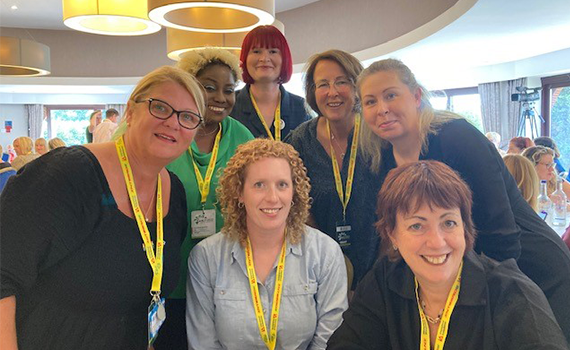Being a better ally - Julie Hollings, Director of Communications & Engagement
14 June 2023
comments: 0

One of our managers stopped me on the stairs recently to tell me that they’d got a colleague’s name wrong. No big deal, perhaps, and something that many of us do in the working day. Only in this case it was. They’d juxtaposed the names of the two female BME members of our senior management cohort and this is a mistake that colleagues have made on several occasions. Wanting to fix this the manager apologised to my colleague. She, in turn, explained just how unhappy it had made her and the impact that it had. She told me that, in her words, he looked ‘crestfallen’ and it sounded as though she felt a little guilty about this.
But she also explained to me how exhausted she is with not only having to be on the receiving end of clumsy language but also having to raise this with colleagues when it happens with that nagging sense that she is making a fuss. The other tiring aspect of this is having to take responsibility for sorting others’ behaviour. Over time, when people experience micro aggressions frequently and persistently the truth is that they get exhausted – as my friend put it: “I am all out of challenge, all out of fight, of calling something out. So when asking for those of us to call out such behaviours we are already demotivated to do so. That’s where having an ally really helps.”
For our colleagues to get demotivated to this level is really concerning – for them, personally - but also for developing a truly inclusive culture within our Trust as evidence shows that an inclusive culture is linked to higher retention, motivation and patient care Diversity improves performance and outcomes - PubMed (nih.gov)
This prompted me to think about the role of allyship and how we can help shoulder the load a little. As a communications professional, my thoughts naturally focused on language and how we might use words to support or undermine inclusivity. We can start by emphasising that language is important, that these seemingly small omissions, slights and miswordings are micro aggressions that all help to make people feel that maybe they don’t belong or that they are being lumped together and not seen as individuals.
I am currently reading the book ‘Better Allies’ by Karen Caitlin and have signed up to the excellent newsletter at www.betterallies.com. I also asked a few colleagues about their tips for better allyship – and have summarised some of these below.
My favourite is the concept of creating conversational speed bumps – which are useful in those moments where you think you’ve heard something biased or disparaging and are able to interrupt it going further by saying: ‘Can we pause for a moment?’ or similar. We are all guilty of communicating on autopilot a lot of the time - especially when we’re busy - and the conversational speed bumps allows people to back up and reconsider what they have just said. It also allows others a moment to pull together their courage to speak up.
The other thing we can do is to acknowledge unfair treatment at the outset rather than attempting to minimise it. Corporate social niceties sometimes lead us to say things like “I’m sure so-and-so didn’t intend to keep you out of the loop,” but actually it’s hugely powerful to respond with, “That’s not right. How can I best support you?” Or “What are we going to do about it?”
It's really important, too, to use the language that people use themselves. So with disability, for example there is a debate around using ‘people-first’ language as opposed to ‘identity first’, so speaking about people with a disability rather than ‘the disabled’. And, of course, no community is a monolith so sometimes the most helpful thing we can do is ask people what works best for them. It’s vital that we respect – and use - the language others use to describe themselves.
Because these are people’s lives that we are describing. Recently at EEAST we published surveys of our colleagues with protected characteristics. Some of the findings made tough reading. Being PR professionals my team and I were keen to manage the difficult messages and to maximise the positives for our organisation. After all, undertaking these surveys is a bold step in itself and the Trust is committed to tackling the issues identified. But having spoken to colleagues, who had contributed to the surveys it was impressed upon me that in my quest to get the best outcome for the Trust’s reputation –– I must not risk trivialising or whitewashing over what is, for some people, still deeply painful and I need to acknowledge their bravery in speaking up. We need to nuance our external and internal storytelling to acknowledge the very difficult experiences that some of our people have had.
Being a good ally - or at least trying to be – can feel daunting. We all worry about getting it wrong and being patronising or worse. But when I worked within the national team at NHSE and spoke with Trans NHS staff who had regularly found nooses left on their desks or who face the very likely possibility that some patients will not want to be treated by them, a little embarrassment – or feeling crestfallen when we have fallen short – feels fairly mild in comparison.
So, let’s all try and speak up for our colleagues where and when we can and help create the inclusive culture that we all want to see at EEAST.
